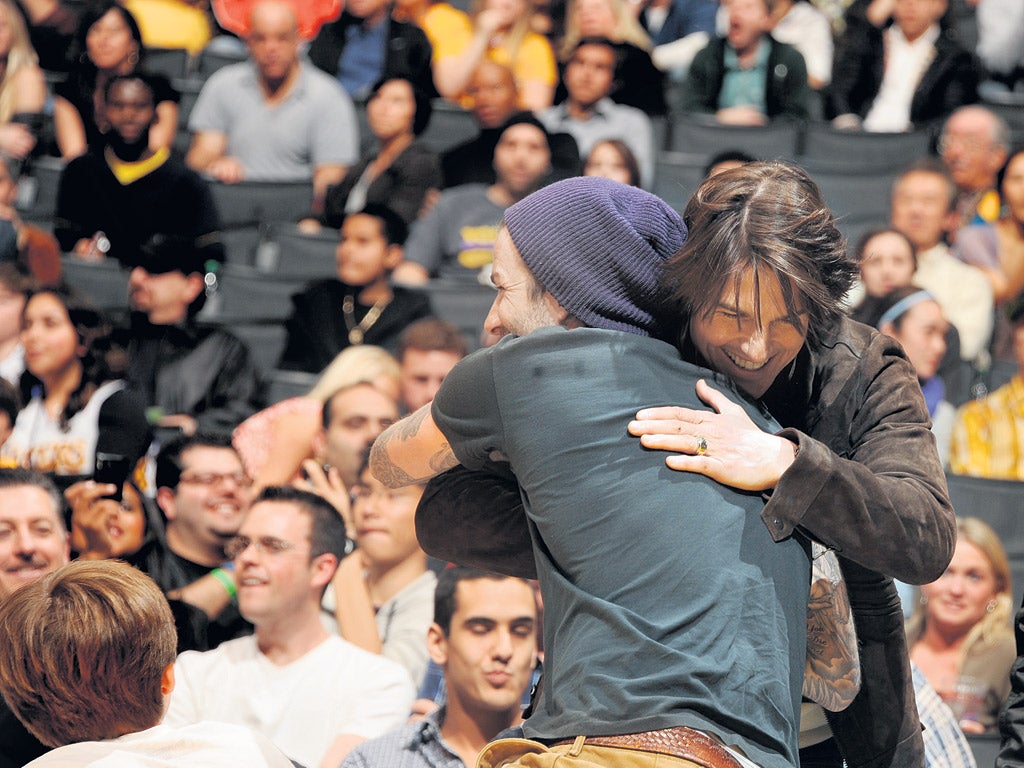Sarah Sands: A friend is not the one you turn to, but the person who turns to you
David Beckham's admission that he has only three good friends rings true


It took a while to digest the revelation by David Beckham that he had only three good friends. Was this a parable of the vagaries of fame? One of the most familiar and admired men in the world, ambassador for the Olympics and underpants, yet he counts his friends on one hand. People who are not multimillionaires, and who are not married to superwives with tiny heads and big sunglasses, counted their blessings. Who doesn't have more friends than David Beckham?
My husband certainly did his calculation. He seemed to remember that he had at least three on his stag night. Only one couldn't make it, and a second was breathalysed on his way to the do and spent the evening in a police cell. Anyway, he definitely had one friend BM (before marriage). He still values his closest pals and sees them at least once every five years. Let's face it, families kill off all but the most thick-skinned of friendships.
People say in times of personal misfortune that you know who your friends are. But do you know where they are? What if they are on a flight or in a meeting? The person you often turn to in a crisis is the person who happens to be there. It is similarly unreliable to define a friend as someone who takes the 3am call. Hillary Clinton ran a presidential campaign on being the right person on the line at that time, but you are not going to phone her when your car runs out of petrol.
It is extremely rare to need to phone someone at 3am, and it is almost certainly an issue for a professional rather than a friend. The AA, in both meanings of the initials, or a plumber. Almost always when I am phoned at 3am it is because someone in the household has forgotten a key, which is nothing to do with friendship and everything to do with incompetence.
If we look again at Beckham's remark about his three friends, we see that it was neither a cry for help nor a comment about the declining role of friends within a marriage. It was, rather, an Aristotlean statement about the nature of friendship.
Friendship is a virtue. To attain it, according to Aristotle, you have to jump through hoops and pass through ages. There is the friendship of youth, which is based on pleasure rather than virtue or fidelity. This is why the young tend to have more friends. Facebook, remember, was launched at Harvard. If it had been created by the middle-aged, it would never have got off the ground, let alone reached critical mass.
The anthropologist Robin Dunbar, author of How Many Friends Does One Person Need?, came up with a target figure of 150, including family and colleagues. This is the average number, in my experience, for 21st parties or weddings. The role of friendship, too, is more illustrious in youth. You could instantly tell at Prince William and Kate's wedding who were friends and who family. The friends were mostly more attractive and exuberant. They may have been further back in the pews but there was no doubt where the action was. "The lives of the young are regulated by their feelings," said Aristotle. Later, ha!, they are tainted by self-advancement or shared school runs. Employees head off joylessly to their boss's weekend house party.
The question of whether friendship has to be between equals is a profound matter. When the Queen praised friendship as well as family, in her Diamond Jubilee speech, I wondered if the friends of a monarch are what the rest of us would call subjects. When Beckham spoke of three friends, he was placing himself in society's top rank. There was an implicit understanding that very few could be trusted with intimacy. A recent biography of the Obamas was similarly insistent about this. The President and his wife have kept a tiny circle of Chicago friends and spurned the attempts of socialites or, worse, parents of their daughters' schoolmates, to make overtures. The moment the couple arrived at the White House, Michelle's brother warned them that they could no longer be sure of anybody's motive.
If public figures are sceptical about friendships with the rest of us, the feeling is mutual. I have had to turn my back on several promising friendships because the person has been in danger of being famous. Celebrity is a difficult thing to handle intelligently or gracefully, and is mostly best avoided. In doing so, of course, we reject Aristotle's secondary category of friendship, which is founded on usefulness or profit. It is unsympathetic to the LinkedIn world view, where personal is professional and friendship is a form of public relations.
Professional friendships can be very jolly. If you are working in the same or related job, you are likely to have characteristics or interests in common. You may not spill your heart out but there is a bond of sympathy and time delightfully spent. The career mentor Mrs Moneypenny describes a close professional group as a "posse". It is a less onerous word than friendship but shares important associations of loyalty and camaraderie. On a variation of E M Foster, if you had to take sides between a friend or an organisation, one hopes you would choose your friend, though a fat lot of good that did Fabio Capello.
Yet you might not confide everything to your posse, and mutual knowledge, as we know, is essential to the Aristotelean principle of elevated friendship. If you become as powerful as, say, the Obamas, there is no advantage in confiding. Their responsibilities are so great that friendship is all risk and no reward.
One of the haunting themes of the Leveson inquiry has been the fear of celebrities that they could not trust their friends. Before they realised that their phones were being hacked, they accused friends of leaking secrets to the press. The value of information put a strain on all their friendships. A journalist friend, whose neighbour is a celebrity, excuses himself from social Sunday lunches because he cannot bear hearing anything newsworthy. Conversely, I am used to people at social events ending boring anecdotes with the irrelevant warning: "And that is not for publication."
The great weakness in friendship founded on self-interest is that circumstances change. Public figures are too often surprised by the drastic loss of friends once they leave office. So what kind of friendship is the Aristotle/Beckham ideal? The philosopher advised: "The moral excellence of friendship involves... a deep caring for and identification with the good of another." Cicero, more prescriptive, said: "It is virtue, virtue, which creates and preserves friendship. On it depends harmony of interest, permanence, fidelity."
Friendship should be based on noble intent and devotion to the welfare and good of the other. Antonio and Sebastian in Twelfth Night are an example of the very high bar of friendship. But the misunderstanding between them could have been resolved more quickly with some imaginative thinking and gossip.
Women tend to scatter friendship more widely and confide in larger groups. Men are " fight or flight", which means they are too proud or unwilling to go for full disclosure. I group my own friends into "dormant" and "active". There are about 20 of whom I am exceptionally fond and at least 20 more I would love to be friends with but we just keep missing each other. The important thing is intent.
Acts of friendship are beacons of pure goodness. I love the example given by the writer Polly Samson of her turning to the journalist Cassandra Jardine with a small baby and nowhere to go. Cassandra opened her home and Polly stayed for a year. As Cicero said: "If we lose affection and kindliness from our life, we lose all that gives it charm."

Join our commenting forum
Join thought-provoking conversations, follow other Independent readers and see their replies